General
Meet Mak Professor with 10 Acres of Livestock Fodder for the December–February Dry Season
Published
5 years agoon
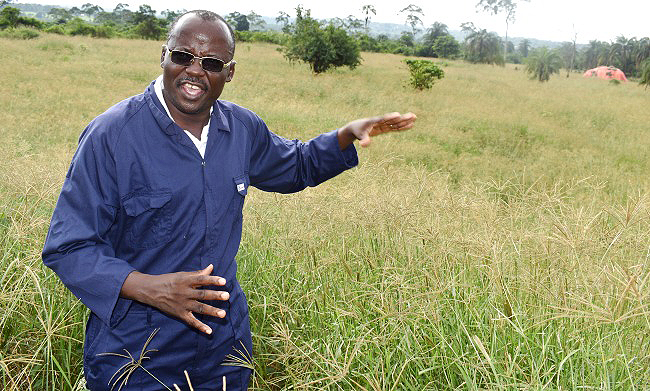
Can Agriculture Professionals roll up their sleeves and blunt the biting effect of drought, occasioned by climate change, on livestock production through research, innovations and entrepreneurship?
The situation
Seasonality of forage is one of the major challenges in meeting nutritional requirements of dairy, beef and dual-purpose cattle, goats, sheep, horses and donkeys in Eastern Africa. Feed scarcity for the livestock is occasioned by frequent and erratic droughts some of which are prolonged. To address this challenge, fodder production and conservation technologies such as hay, silage and haylage production technologies have been introduced and promoted as a potential strategy to addressing feed scarcity among farmers. These technologies are aimed at increasing livestock feed availability during the dry periods in addition to diversifying income through sale of hay bales and grass seed among communities. However, while previous studies have shown an increasing trend of acceptance and adoption of forage and its conservation as hay among farmers in Kenya, Tanzania, Ethiopia, Somalia and Djibouti, farmers in Uganda have not fully embraced the fodder conservation technologies. Failure by farmers to adopt scientific innovations to solve the real challenges of feed scarcity that face livestock farmers during prolonged drought makes us wonder why?
Why the Need for agricultural professors to roll up their sleeves?
Despite the known benefits of fodder conservation, which has been taught at Makerere University and other institutions of higher learning for over 50 years, there is scarcity of information on fodder value chain that is crucial in informing development and up scaling the technology of hay production as a business among the communities.
Prof. Kabi, an animal scientist from the College of Agricultural and Environmental Sciences (CAES), Makerere University has innovated an alternative way of taking the university lecture room to the communities. Prof. Fred Kabi has rolled up his sleeves and has dedicated his livestock science knowledge, skills and over 10 acres of land situated in Kapeka to production of Chloris gayana hay intercropped with Centrosema pubscens legume. This could also be a driver for aspiring farmers to open up and learn a new approach to growing pastures and its conservation as hay for livestock feed as a way of diversifying enterprises at the farm. He is optimistic that within four years , he should open up about 40 acres populated with Chloris gayana and Cencherus ciliaris grasses together with Desmodium and Stylosanthes guianensis legumes all of which are drought tolerant pastures. In his words, this action is intended to blunt the biting effect of drought among dairy and beef farmers most of whom lose revenue during prolonged droughts when the milk prices are very high yet milk production drops due to insufficient fodder availability.

Ecological green gold for job creation and sustainable employment
High demand for milk and meat consumption in urban and peri-urban areas irrespective of seasons will be the major market driver for feeding hay to livestock as an alternative to the green chop of elephant grass during the dry seasons in Uganda. While elephant grass can be a promising source of fodder due to its prolific growth during the rainy season, its growth is seriously curtailed during the dry season leading to fodder deficiency. Moreover, it is during the dry season when the prices of milk go very high. Since the crude protein content of Chloris Gayana grass is comparable to that of elephant grass (about 9 to 12 %), Prof. Kabi thinks production of Chloris Gayana grass and the drought-tolerant legume pastures conserved as hay and their seeds needs to be exploited as an enterprise to meet the growing needs of farmers. Uptake of hay and seed production by entrepreneurs with the necessary factors of production, knowledge and skills is one way of turning the challenge of erratic and prolonged droughts into an opportunity for job creation and employment especially for the youth and women.
Together with his graduate students, Prof. Kabi thinks innovation along the dairy and meat value chains can lead to cottage industries where pasture hay can be pulverized into small pieces and mixed with other ingredients such as maize, cotton seed cake and minerals as a total mixed ration. When bagged rather than baling, Prof. Kabi considers this as a practical application of innovative feed solution for not only peri-urban farmers but as a potential export to the region. This is where the University don is advocating for a deliberate effort and government policy to make sure that just like Tourism is advertised, a deliberate effort to create jobs for the youth can be made by advertising Uganda as a possible source of bagged hay as green gold. Production of hay for local, regional markets is one of those efforts that can meaningfully engage the youth in the dairy and beef value chains. For effective exploitation of pasture hay as green gold, there is need for deliberate effort to organize not only production but the market. It is the belief of the professor of animal nutrition that the future of the youth involvement in the dairy or beef value chain only belongs to the organized. But organization of the youth in any production enterprise along any given value chain will only be successful if such production is driven by the market incentives Kabi says.
Turning the challenge into an opportunity
The CAES Communication office followed up Professor Kabi to Kapeka to establish the motivation behind his involvement in pasture grass establishment for livestock among the communities. The Don says that after careful analysis of the beef and dairy value chains from the perspective of an animal nutritionist, he has established that there were so many people who want to do dairy or beef farming business but lack pasture feed resource for their animals. Moreover, the scarcity of pastures is more prominent among peri-urban farmers with a good market of their milk and beef but with limited land to produce fodder for livestock. So, he took on that challenge as an opportunity.
“Secondly, during prolonged dry seasons which are due to the challenge of climate variability, livestock farmers cannot sustain the same number of animals at the farm kept in the wet season due to limited access to feeds. Since the consumers’ demand for milk and meat has gone up yet the farmers who produce milk and meat for one reason or the other cannot adopt technology for producing feeds for the milking animals during the dry season, someone has to close the gap but at a cost.

Scientists who preach the science of fodder conservation and nutrition in lecture room can now innovate and participate in value addition to pastures to bridge the gap of limited milk and meat supply during the dry season. Producing hay in Kapeka is like constructing a lecture room among the communities. This was one of my incentives to go into pasture production for hay. This will not only demystify the science of fodder production and conservation but will also create jobs among the youth, help in diversification of income and help build market for the hay and seed”, Prof. Kabi explained.
The don cites the experience of farmers in Uganda who planted maize and had to sell it at a price of UGX200 a kilogram. But a kilogram of hay goes for UGX500-700 or a bale of 10 to 15 kg from UGX5,000-7,000 while a kilogram of Chloris Gayana seeds fetches up to UGX3,000-4,000 while that of green leaf desmodium can fetch up to UGX150,000. This puts a farmer’s land and knowledge to good use and contributes to the dairy and beef value chain.
Clad in his blue overalls, the Professor cuts the mature Chloris Gayana, pauses and says, “Here, we are with the question – Can agricultural sciences, innovations and entrepreneurship blended with policies be able to solve the challenge of youth unemployment?”
The answer according to the Professor can be yes or no.
Prof. Kabi observed that farming in Uganda has been mainly on a small-scale subsistence without organized markets and this can never appeal to the youth as a cool engagement. In the affirmative, however, once there is organized market, this will be the driver for accepting scientific innovations and a way of igniting entrepreneurial skills among the youth for as long as they can be able to earn from their engagement in agriculture.
However, Kabi explains that understanding the whole dairy or beef value chains at the local, regional or at international level is crucial for positioning agriculture as a source of employment to the youth. For instance, about 50 years ago, Africa commanded about 6% of the global trade volume. This has been declining over the years and right now, Africa transacts about 2.4% of the global trade volume. To be specific, the current trend now indicates that the volume of trade of Africa excluding South Africa, Egypt and Morocco i.e. Sub Saharan Africa is 1.7% of the entire global trade. According to the Professor, this creates a worrying challenge of unemployment because there is an imbalance of trade.

“So how can agricultural sciences, innovations and entrepreneurship be able to take us back into commercial trade and export that was enjoyed by Africa in the 1950s? This is where export drive livestock production is so crucial to the nation Uganda. Uganda needs to understand the dairy, and meat value chains so that we can be able to position ourselves to penetrate the international market. This can be through non-conventional agricultural produce such as hay and pasture seed production”, explained the Professor as he pointed at the garden.
Borrowing from the Ethiopian experience, Professor Kabi said, at the last quarter of the year 2018 there was a deliberate effort in Addis Ababa for the country to access regional markets in terms of hay. Demand for hay market could go as far as the Middle East as a result of climate change, a development that entrepreneurs were taking advantage of.
In the middle East, Kabi cited that the market is interested in live meat goats of a given conformation. Finishing such goats on processed hay seems like a plausible way of meeting standards for such external markets. Relatedly, in an international meeting organized by the International Livestock Research Institute (ILRI) under the auspices Food and Agricultural Organization (FAO) of the United Nations, the representatives of Intergovernmental Authority for Development (IGAD) opined that some countries can indirectly participate in the dairy and meat value chain by producing fodder that is required for the industry.
Prof. Kabi asserts that Uganda too, can have a cottage industry to process hay and make it ready for farmers who keep dairy and beef animals, spearheaded by professors who are the proponents of feed conservation but driven by the youth. The whole of Kampala for example has small holder farmers practicing zero grazing. The 10 acres of land under Chloris Gayana pasture production for hay is equivalent to 4 hectares. Each hectare can yield 25 to 35 tons of hay dry matter per year, which is estimated to annually feed 5-6 mature cows.
Kabi says, if we have several of such hay farmers organized into a cooperative, we can feed the dairy industry at a local level but with excess available for export to countries like Kenya which are yearning for feeding materials. But is there a deliberate effort by Uganda to organize both production and market of non-conventional produce so that people do not only look at growing priority crops such as maize but diversify to fodder as an alternative source of foreign exchange?” He asked.

Prof. Kabi notes that Uganda can be able to export hay to Kenya and middle east but this requires a deliberate effort to get both production and market organized. This he said is what happened when colonialists were able to organize markets for coffee, minerals and cotton.
“This explains why paradoxically the African share of the global trade almost a sixth of what it was 50 year back. The decline in the volume share of trade from Africa as a proportion of the global trade is certainly a reflection of the real poverty on the continent and together with unemployment for the youth”, He said.
The professor thinks that the only way to solve the challenge of imbalance of trade is to think beyond conventional trade especially of agricultural produce and to diversify it with alternative ecological exportable produce including processed hay for income and employment creation for the youth. Value addition through cottage industries where science, innovation and entrepreneurship is blended with deliberate policy of production driven by export trade is needed. Uganda can surely be marketed and known to be a hay basket for the whole region.
Prof. Kabi further notes that if a deliberate effort is not taken to create the markets for unconventional products, then the country can never have its agriculture produce access regional and international markets. However, he emphasized the need to export produce in a sustainable way, where sustainability means making use of low input natural resources like the Chloris Gayana intercropped with Centrosema as a legume that is naturally occuring but with value addition to be competitive in the market. This can be the basis for inspiring the youth to get involved in agriculture.
Nutritional value of Chloris Gayana
The high yield of Chloris Gayana of 25 to 35 tons per ha per year coupled with its high crude protein content of between 9-12% is comparable to that of 10 to 50 tons of elephant grass with crude protein content of 10 to 13 %. The most important point is that Chloris Gayana can withstand dry conditions making it the right crop in the face of climate change. It simply rejuvenates after cutting unlike elephant grass which is only prolific in growth during the rainy season. Besides, Chloris Gayana can be intercropped with legumes such as centrosema , desmodium (both green and silver leaf), siratro (Bishops purple), stylosanthes and glycine.

Farm management practices
The seedbed for Chloris has to be a fine tilled just as is the case for millet, because the seeds of the pasture are quite small. After seedbed preparation, you have to ensure that you plant at the onset of the rains in the same planting season of maize. Furrows are dug either manually or mechanically. Chloris Gayana is planted in rows like maize at spacing of 2ft from one row to another to allow ease of weeding because while young it can easily succumb to weeds. The seeds are mixed with sand, black soil or preferably composted cattle manure and broadcast within the dug furrows. A thin layer of soil is used to cover the seeds so that they do not fail to emerge and to protect them from being systematically eaten up by birds. After some 7 to 14 days, the seed will germinate. However, if it is dry, it may fail to germinate. If the germination percentage of the seed is 50% and above, the seed bed should be entirely covered by three months. If the germination percentage is below 50%, allow the seeds to shutter in the garden. With proper weeding and rains, the next ratoon will be ready for seed harvesting after 30 to 50 days. After harvesting you weed and manure the grass to that it can maintain the growth vigor.
Unlike the Chloris gayana seed which has to be harvested as soon as it is ready to avoid shuttering and its destruction especially by the birds, hay should preferably be harvested at dough stage when half way the garden is flowered. However, the harvesting should coincide with the onset of the dry season to avoid moulding. The cut grass should be raked to enable thorough drying to only 15 % moisture content like maize grain. The dried hay should then be baled using either tractor driven hay balers or hand-operated hay baler boxes. Baled hay should then be kept in a cool and dry shelter that is water proof preferably raised on pallets or in a crib like maize. Failure to adhere to these conditions will lead to moulding.
Challenges of farming Chloris Gayana
Growing the fodder on ten acres requires machinery including a tractor and accessories such as a reciprocating mower, a rake, a tractor-operated baler and a drying shed for green curing so that customers end up with green rather than golden hay color before its storage. This is crucial in conserving the beta carotene or the precursor for vitamin A necessary for the yellowish creamy color of milk.
The other major challenge challenge is labor. Youth do not think hay is a lucrative business to be engaged in. However, professor Kabi thinks if organized and turned into an enterprise, the youth will realize hay production is green gold that is worth getting engaged in especially if the market is streamlined. This is the reason why the professors should roll up their sleeves, get their hands dirty as role models for the youth and attempt to turn the challenge of prolonged drought occasioned to livestock by climate change into an opportunity.
Report compiled by;
Jane Anyango,
Principal Communication Officer, CAES
You may like
General
Admissions opportunity for International students at Indian Institute of Technology (IIT)
Published
1 day agoon
April 24, 2024By
Mak Editor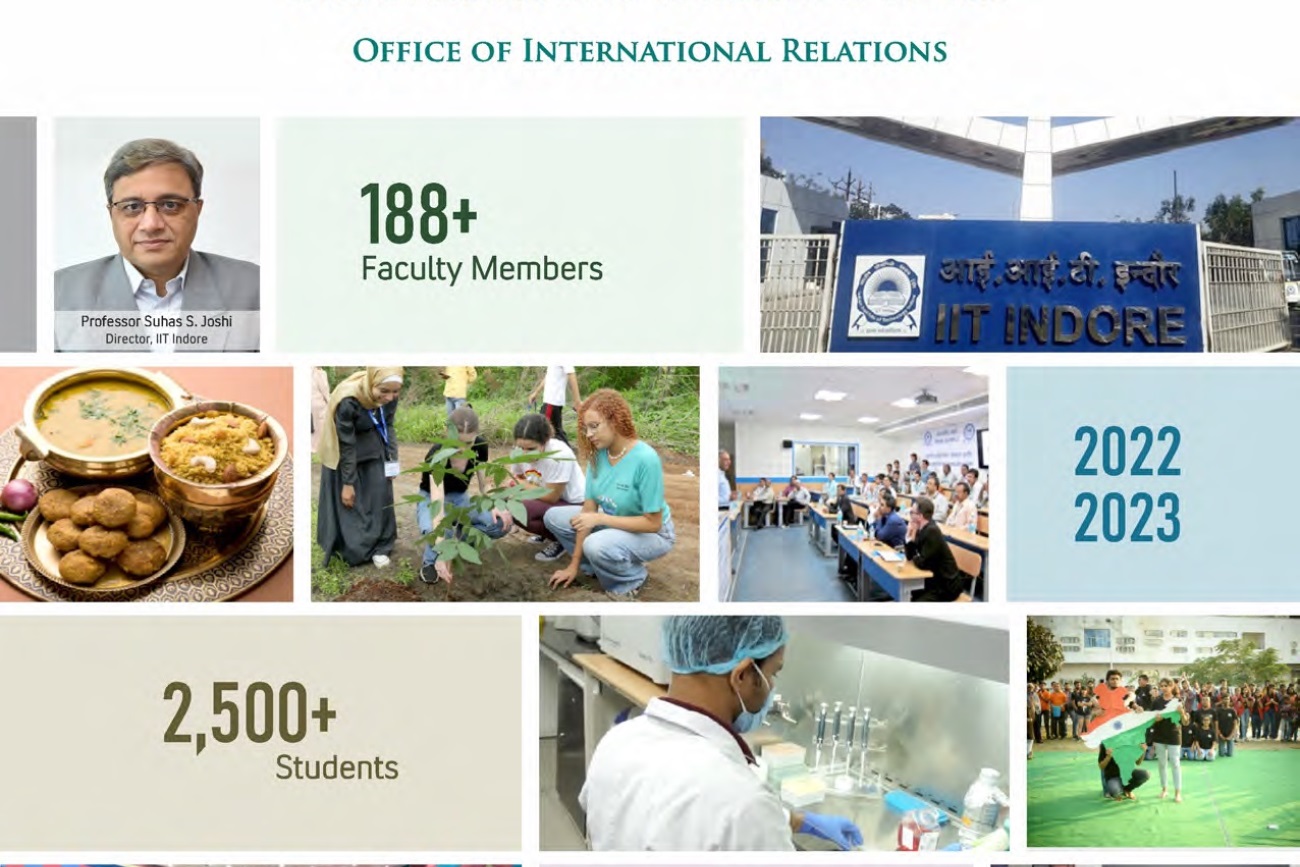
Indian Institute of Technology Indore (IIT Indore), situated in the central part of India in the state of Madhya Pradesh, is an institute of national importance established by the Ministry of Education, Government of India (https://www.iiti.ac.in/_). At present IIT Indore has 11 Departments and 13 Centers of Excellences in Science, Engineering and Humanities offering various UG/PG, Ph.D. programs in diverse fields (https://academic.iiti.ac.in/academic_program.php_. IIT Indore has established state-of-the-art research laboratories, modern lecture halls, on campus accommodation, health center, libraries, Indoor and outdoor sports complex.
Currently, we have 2800+ students and Ph.D. scholars, 200+ highly qualified faculties. IIT Indore has been ranked between 101-150 in Young University Rankings in THE World University Ranking 2023, and 396th QS World University Ranking 2023 with more than 6500 international high impact publications, over 100 technologies and more than 130 patents. We have also established the Advanced Centre for Entrepreneurship (ACE) to foster innovation and entrepreneurship. Moreover, we have signed more than 100 Memorandum of Understanding (MoUs) with various foreign Universities/institutions across the globe.
We are excited to announce that Admissions are now open at IIT Indore for PG and PhD programs for the academic year 2024-25. This provides an excellent opportunity for aspiring international students to pursue higher education in India and broaden their horizons with intercultural programs aimed at offering academic and research exposure.
Students can apply for admission through various programs sponsored by the Ministry of Education, Government of India. These programs include:
- Study In India (SII): The Study in India is a flagship project of the Government of India. The SII program offers scholarships and tuition fee waivers for meritorious students applying to the program. Institutes under the initiative offer from 25% to 100% tuition fee waivers.
Visit the website for more information: https://studyinindia.gov.in/ - Indian Council for Cultural Relations (ICCR): Its objective is to foster and strengthen cultural relations and mutual understanding between India and other countries; to promote cultural exchanges with other countries and people; and to develop relations with nations.
Visit the website for more details: https://studyinindia.gov.in/indian_council_for_cultural_relations_(iccr) and General Announcements for International Students Under ICCR Scholarships: https://iccr.gov.in/announcement - Additionally, students may apply directly under the Self Finance Category. To apply, please send your testimonials and certificates to acaofficer.ir@iiti.ac.in or geeo.ir@iiti.ac.in
Kindly visit the following YouTube page to get more information aboutIIT Indore: https://www.youtube.com/@managerir
General
Mak DARP Project Launch to Revolutionise Management of Academic Records
Published
3 days agoon
April 22, 2024By
Mak Editor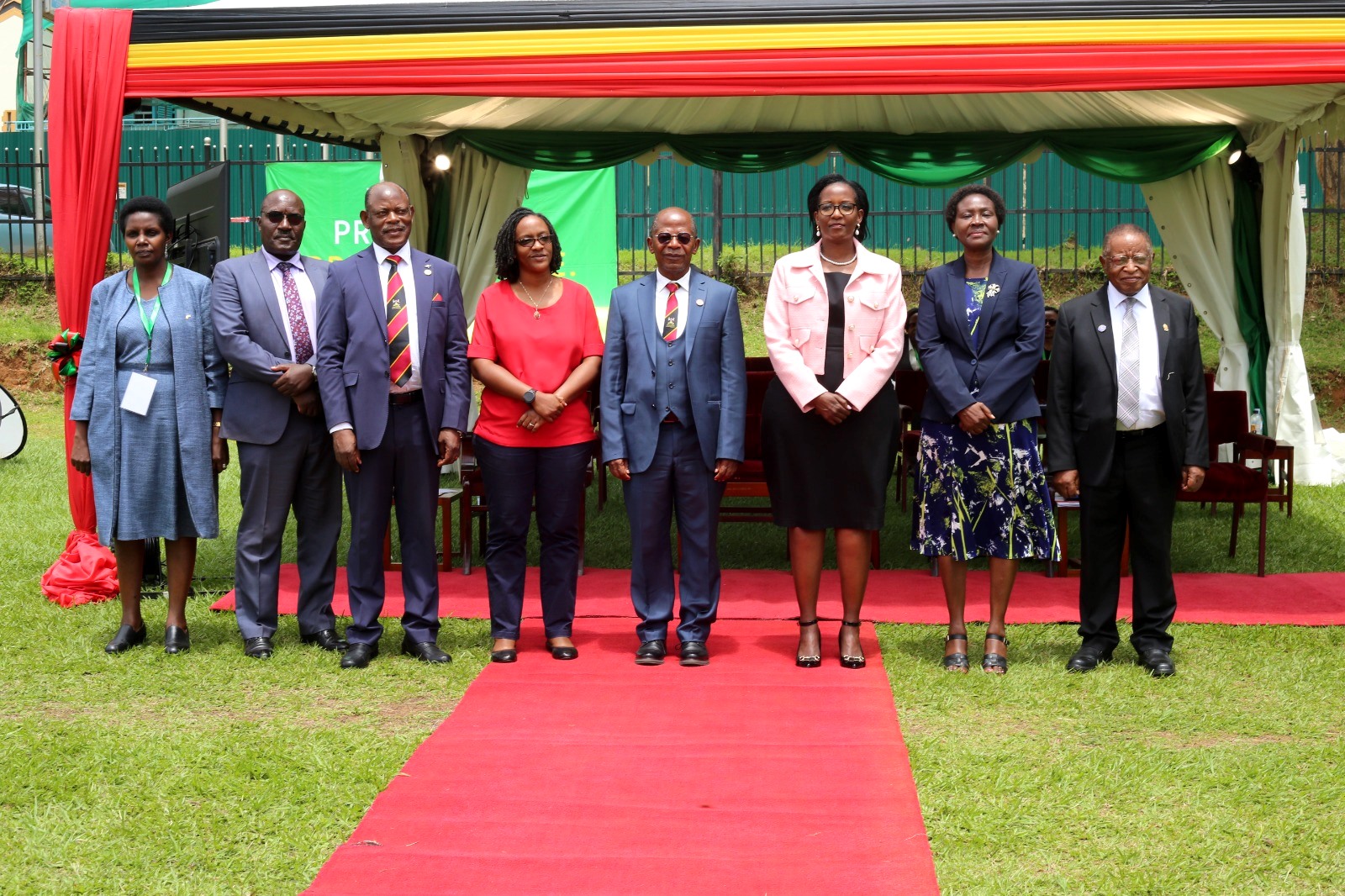
By Ritah Namisango
“This initiative, funded by the Government of Uganda through Makerere University Research and Innovations Fund in partnership with the Mastercard Foundation, represents a significant step forward in our efforts to modernize and digitalize our academic processes. It’s therefore with great pleasure and pride that I launch the Digitalization of Academic Records and Processes project at Makerere University, and I commission the Registry of Students’ Records and the Archive of Students’ Records,” stated the Minister of Education and Sports, Hon. Janet Kataaha Museveni represented by the State Minister for Higher Education, Hon. John C. Muyingo.
As the world continually evolves from manual and traditional methods of records management to modern and digitalized processes, Makerere University launched the Digitalization of Academic Records and Processes (DARP) project to ease the storage, retrieval and acquisition of academic documents by her stakeholders.
The project has digitalized records and implemented new processes as well as established a digital state-of-the-art storage facility at the Senate Building to securely store university academic documents. The digitization process comes along with a university policy that guides on how to record, manage, retrieve and dispose of records not in use. This project is designed to reduce on the substantial amount of space that paper storage systems occupy as well as safeguard records from disasters like fire.
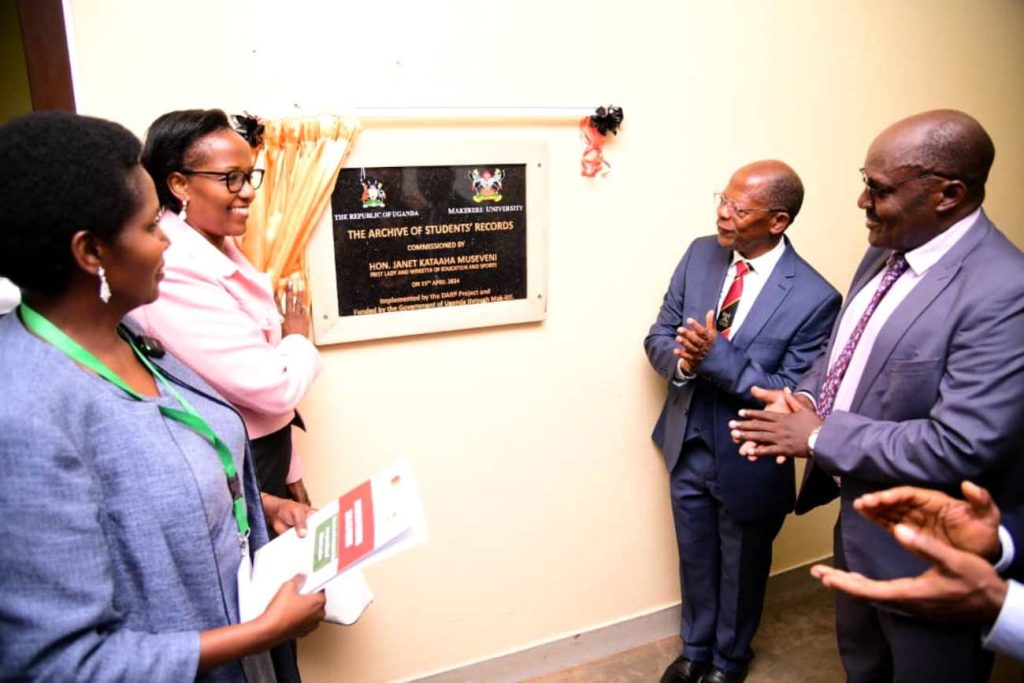
Officiating at the launch of the DARP project on Friday 19th April, 2024 at Makerere University Freedom Square, Hon. John C. Muyingo, affirmed on behalf of Hon. Janet Kataaha Museveni that the launch was a significant milestone in the history of Makerere University.
The Education and Sports Minister further noted that in today’s fast-paced world, universities must manage massive amounts of academic information, and efficient record keeping necessitates that the information is accurate, accessible and secure, benefiting both the institution and its stakeholders. She noted that the DARP system would streamline the processes of managing and accessing academic records, resulting in significant timesaving for students and other stakeholders at the university and beyond.
“Digitalization of academic records and processes is an innovation set to revolutionize the way records are managed by addressing pressing public concerns such as efficiency, security, integrity and accessibility as well as eliminating the unnecessary delays in the processes. The traditional manual approach, while effective in its time has become increasingly challenging to sustain in this digital world, therefore, digitalizing academic records and processes provide crucial responses to the monotonous questions that the outdated manual system never addressed,” stated the Minister’s speech.
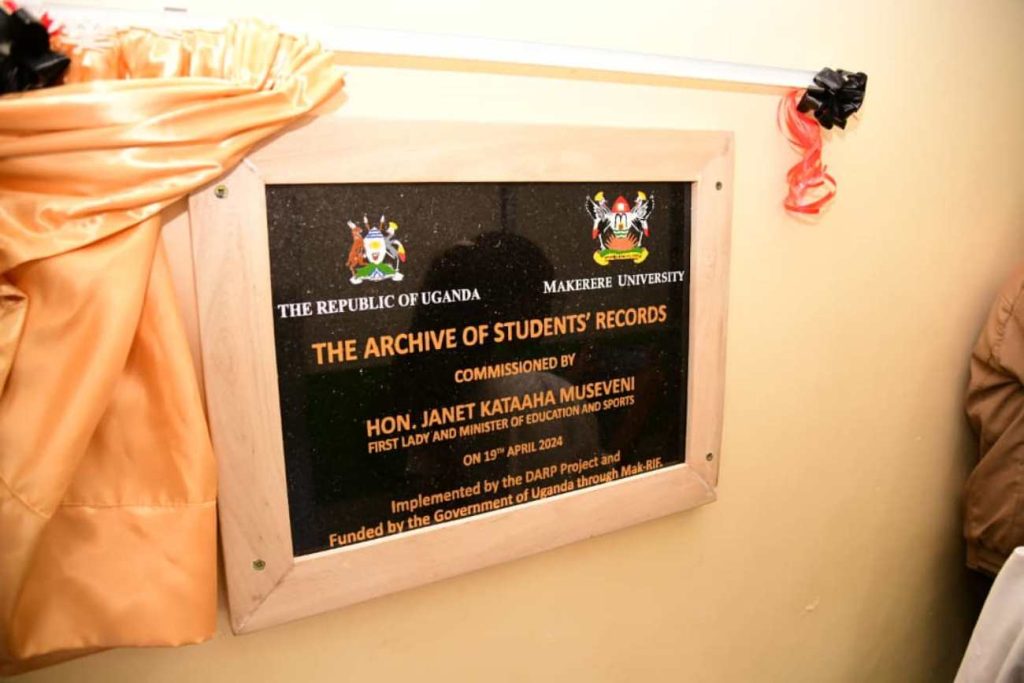
Having outlined the challenges and risks that the traditional paper-based record keeping systems present such as the storage space factor, the risk of mixing active and inactive records, the high rate of wear and tear as well as vulnerability to manipulation of records, the Minister commended Makerere University on the enviable track record of efficiently managing and securely storing its academic documents, Senate minutes, curricula, examination results and students files for nearly a century, despite political upheavals and other challenges.
She observed that digitalized systems would make academic records more accessible to the students and eliminate the frustration of delays caused by bureaucratic inefficiencies and the outdated paper system, enabling them to timely take the necessary steps in academic and professional progression.
As the University embarked on its journey of digital transformation, Hon. Janet Kataaha Museveni equally applauded Makerere for continuously upholding its commitment to academic excellence, research and innovation. She advised the fraternity to stay committed to the principles of innovation and inclusiveness that define the University. As such, she urged them to embrace the digital transformation wholeheartedly so as to harness the power of technology and enable Makerere University to remain a beacon of excellence in the academic world.
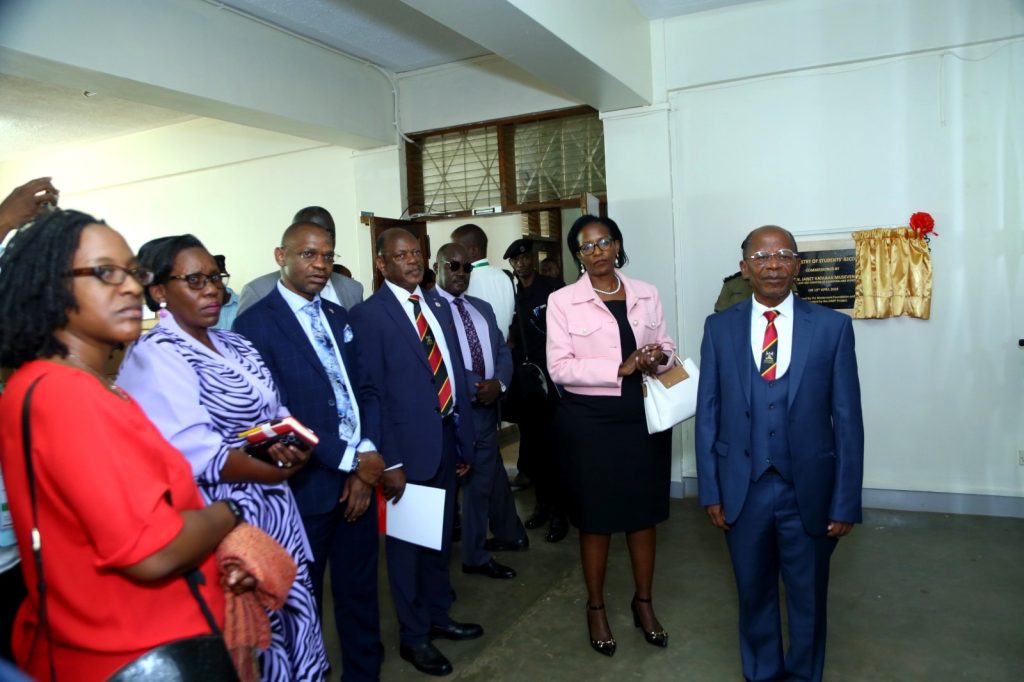
“Since its establishment in 1922, Makerere University has been a beacon of knowledge and learning, shaping the minds of generations of students and contributing significantly to the development of our nation, Africa and the world at large. Thank you for these brains. Your hard work, expertise, and dedication were instrumental in building this DARP project to realization. I am confident that you will have a lasting and positive impact on this university and the entire education sector, not only in Uganda, but the entire world,” said Hon. Janet Museveni.
The First Lady expressed her gratitude for the partnership with Mastercard Foundation and the support it renders in advancing education and innovation at Makerere University.
The Vice Chancellor, Prof. Barnabas Nawangwe highlighted that the launch of the DARP project was not only a landmark achievement for Makerere University, but also a confirmation of the importance that the University Council and Management attach to the role that digitalization and e-services play in implementation of the University strategic plan that continually strives for a professionally managed university.
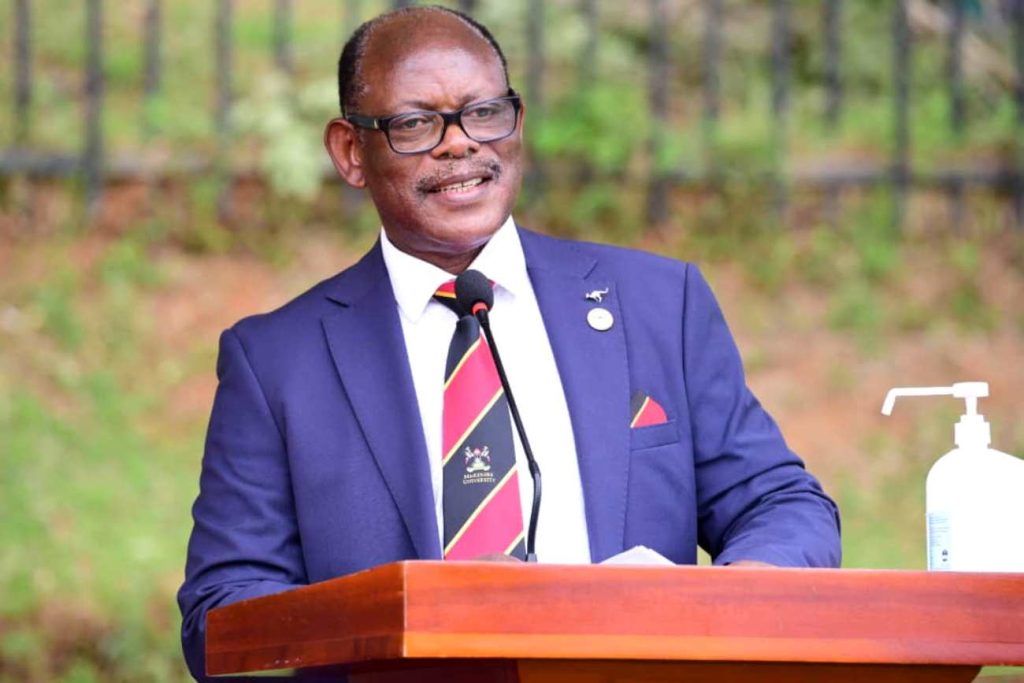
The Vice Chancellor revealed that the official launch of the DARP Project, undertaken in-house by a hardworking team of University staff, was a financial gain on the part of the University and an additional asset in the quest to improve efficiency and effectiveness as far as the University academic records and processes are concerned.
“Our current drive has been the continued digitalization of various business processes and services so as to be more responsive to the dynamic needs of our students, staff and stakeholders. We have been able to achieve this through intentional development of our in-house information systems development capacity, which has saved us a lot of funds in terms of initial purchase as well as annual license renewal costs,” said the Vice Chancellor.
Prof. Nawangwe stated that the DARP project has greatly contributed to the timely and improved service delivery to students and clients. He added that the ultimate goal is to enable students download their own transcripts without need for elaborate physical processes at the university.
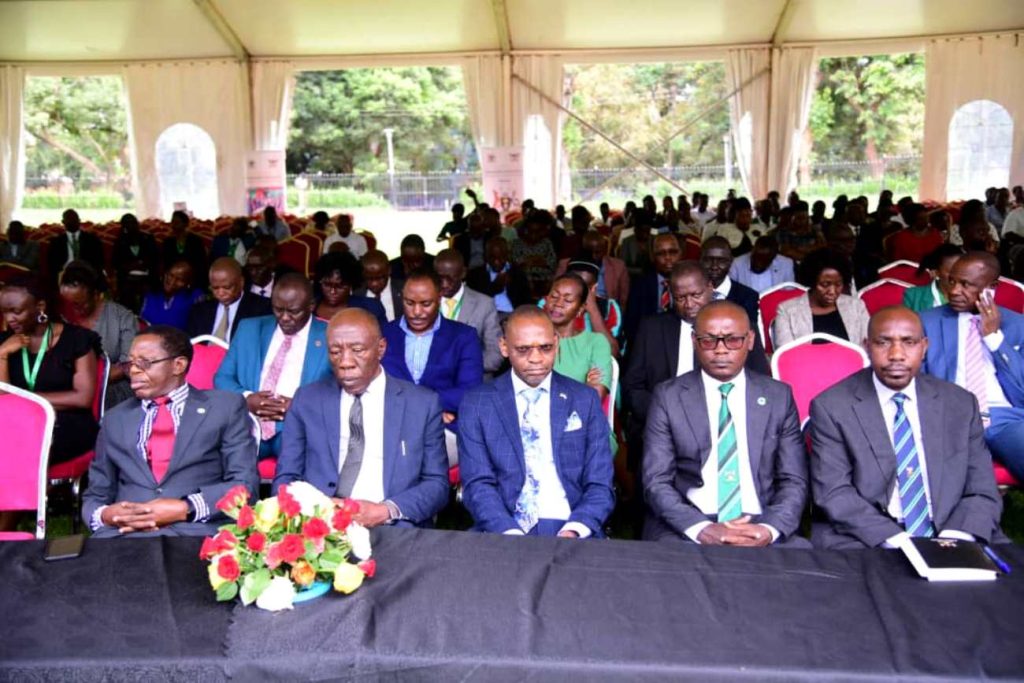
“During the 74th graduation ceremony, Makerere University was able to issue academic transcripts to qualifying students before graduation. I am pleased to inform you that we succeeded in issuing of academic transcripts before the graduation date because of the DARP project, which we are launching today. With the digitalization of students’ academic records, the University is now in a better position to provide the required information and data on time,” said the Vice Chancellor.
Prof. Nawangwe elaborated that Makerere, being Uganda’s Premier University has been a major beneficiary of several initiatives aimed at improving ICT infrastructure and connectivity. He added that the University has been able to achieve this largely due to the generous donations of the Government of Uganda and other development partners. He thanked His Excellency Yoweri Kaguta Museveni, the President of Uganda whose support led to the creation of the Research and Innovations Fund (Mak-RIF) in the 2019/2020 financial year with initial funding of UGX 30 Billion.
He revealed that the funding has continued to be availed throughout the last five financial years, which is clear demonstration that the Government of Uganda esteems Research and Innovation as catalysts to Uganda’s continued march from a peasant to a modern and prosperous country.
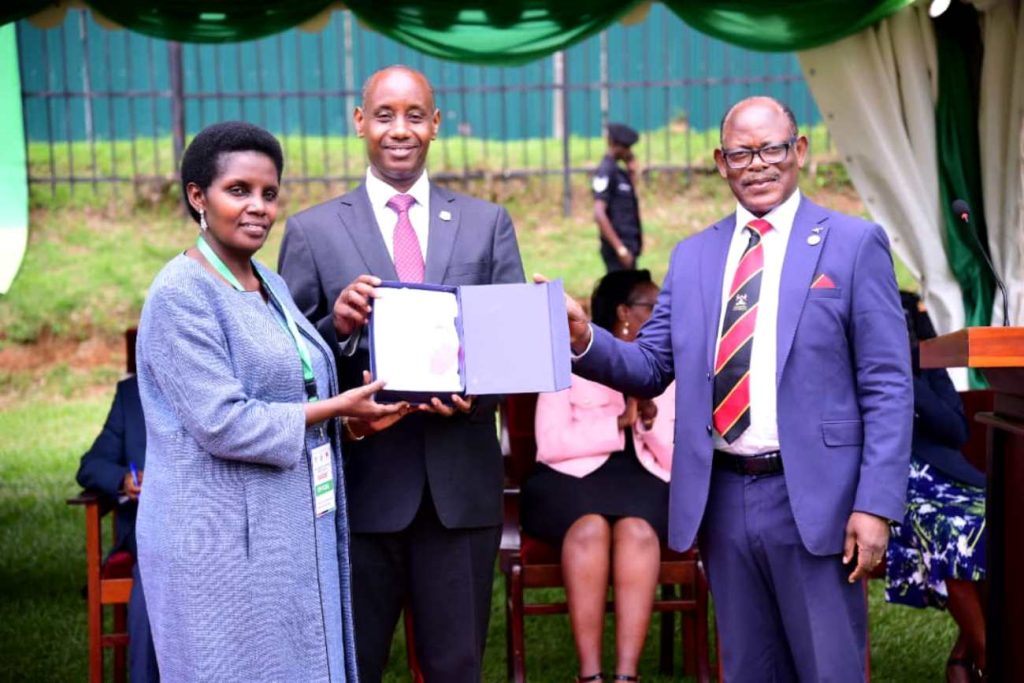
“I am proud to say that Mak-RIF has transformed Makerere’s academic and research landscape tremendously. Over the last five Financial Years, we have worked with other key stakeholders including Government ministries, institutions, agencies, organizations, and the private sector. Together, we have continued to increase the local generation of translatable research and scalable innovations that address key gaps required to drive Uganda’s development agenda, especially the un-funded priorities” stated Prof. Nawangwe.
In the same spirit, the Vice Chancellor applauded the Principal Investigator and Team Leader DARP, Mrs. Patience Rubabinda Mushengyezi and all the Team Members for the hard work that has improved the status of academic records and processes from manual processes to e-services. The DARP project is a collaboration between the Academic Registrar’s Department, College of Education and Externals Studies (CEES), College of Computing and Information Sciences (CoCIS) and the Directorate of Information and Communication Technology Support (DICTS). The DARP Project team includes: Prof. Betty Ezati, Dr. Peace Tumuheki, Dr. David Luyombya, Dr. Joyce Bukirwa, Ms. Ruth Iteu Eyoku, Mr. Juma Katongole, Mr. Joshua Muhumuza and Mr. Lubowa Gyaviira.
The Vice Chancellor also thanked the Makerere University Research and Innovations Fund (Mak-RIF) and the Mastercard Foundation for supporting different phases of the DARP Project.
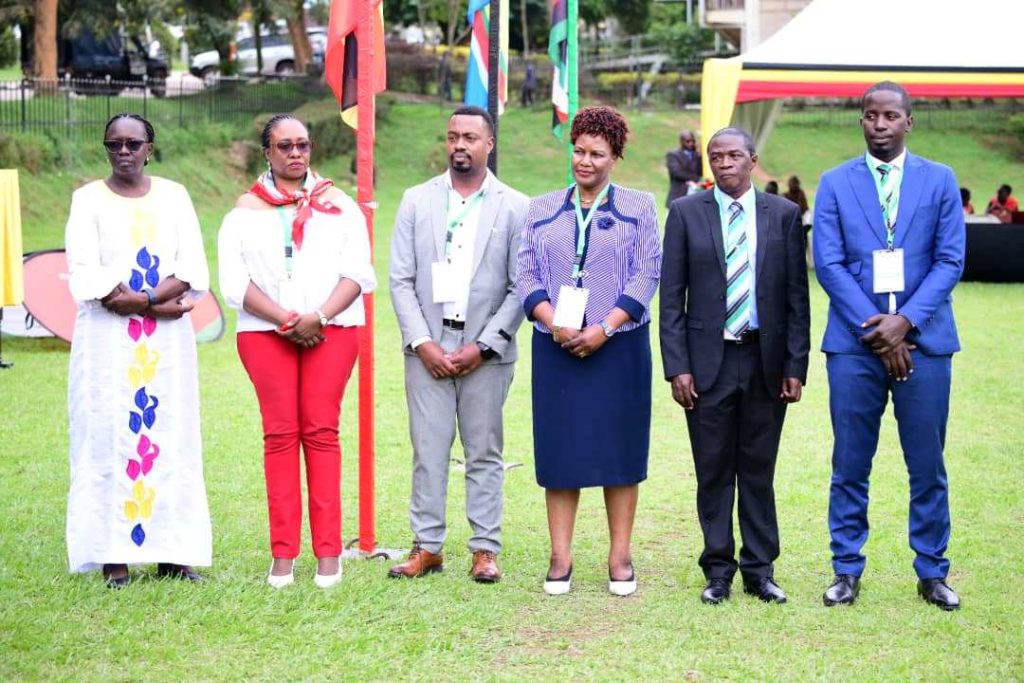
Mrs. Lorna Magara, the Chairperson of Makerere University Council acknowledged that launching the DARP project at Makerere University marked a significant step forward in digitalizing higher education services. She underscored that the transformational power of digitalization could not be overstated. She stated that by implementing an Academic Records Management System, the University would streamline the tracking and retrieval of academic files and establish a robust platform for digital certification and record verification.
“In an era where credential fraud poses a significant challenge, the DARP Project reinforces transparency, trust, and confidence in our academic processes. It is testament to our commitment to excellence. The DARP Project heralds a new era; one where our certificates and transcripts are shielded against increasingly sophisticated forgeries. By providing digitally verifiable academic documents, we empower employers worldwide to expedite verification procedures,” she articulated.
The Chairperson stated that Makerere University aims to create a dynamic and integrated learning environment with a goal to equip students with the skills and knowledge needed to thrive in an ever-evolving world. She emphasized the need to prioritize student-centeredness and adaptability which vision perfectly aligns with the DARP Project to ensure that the most deserving students can compete fairly in the job market alongside genuinely qualified candidates.
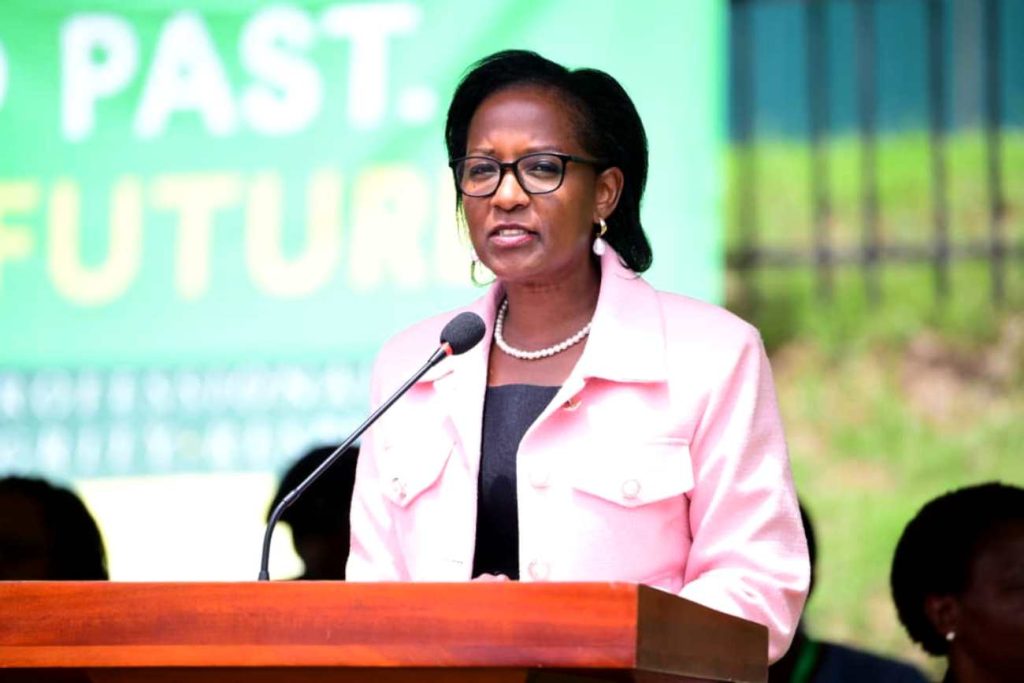
She advised that a system’s effectiveness hinges on the quality of input it receives, therefore, meticulous attention to detail is essential to ensure that the necessary information is accurately fed into the system to yield the expected outcomes. She recommended that vigilant effort has to be invested in ensuring quality processes in how the information is gathered and fed into the system, and the quality of persons tasked to do the work.
Mrs. Magara praised the DARP Principal Investigator for initiating the project in support of the University’s efforts to; address the critical element of maintaining integrity of academic records, significantly contributing to the University’s commitment to digitizing systems, and upgrading the process of archiving of records for ease in verification, certification, and retrieval.
She also extended appreciation to the Government of Uganda for the provision of funds through Mak-RIF, and to Mastercard Foundation for the provision of equipment and other support that will facilitate safe processing and storage of the academic documents.
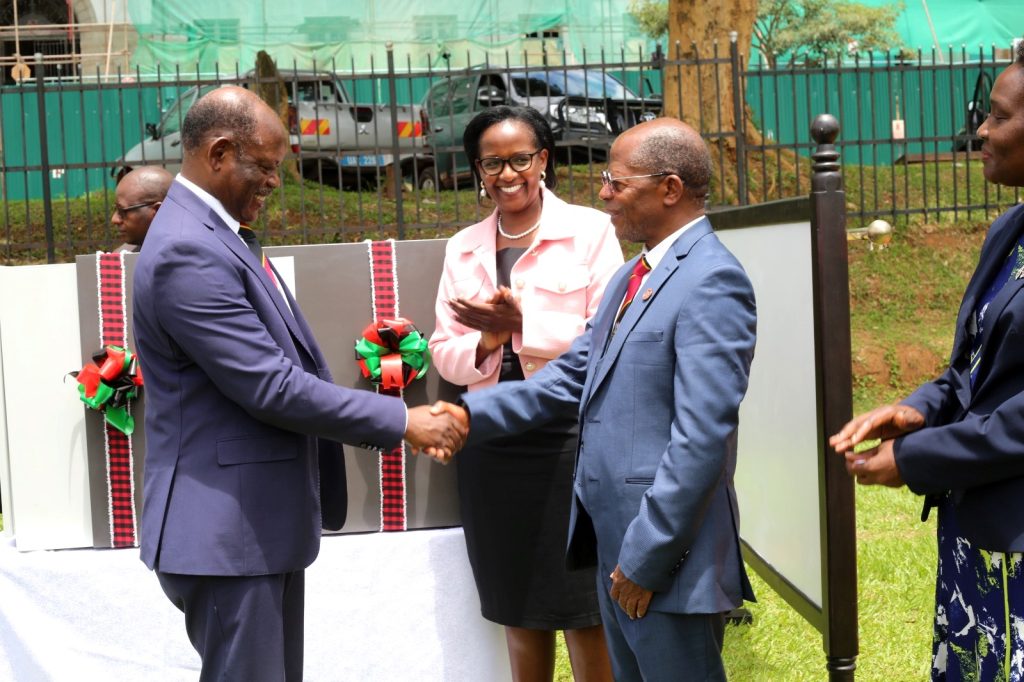
The Principal Investigator and Team Leader, DARP project, Mrs. Patience Rubabinda Mushengyezi proclaimed that the launch of the project was the birth of a new era in records management at Makerere University.
To enable the audience to understand and appreciate the situation before the DARP project, Mrs. Mushengyezi shared a documentary that highlighted the transformation from a purely manual process to a digital one. She added that the digitalization of student records from the 1980s changes the narrative of delays and long queues to fast, timely and friendly services to the students.
The Principal investigator disclosed that the DARP project team’s aspiration was to have the digitalization of students’ records rolled out in all the schools and colleges of the University. She observed that because of the hard work of the DARP team, they now have clear and well organized documents and the ‘ugly’ records shall never be seen again since they no longer exist. She expressed gladness that what started as a vision had become reality, culminating in the launch of the DARP project.
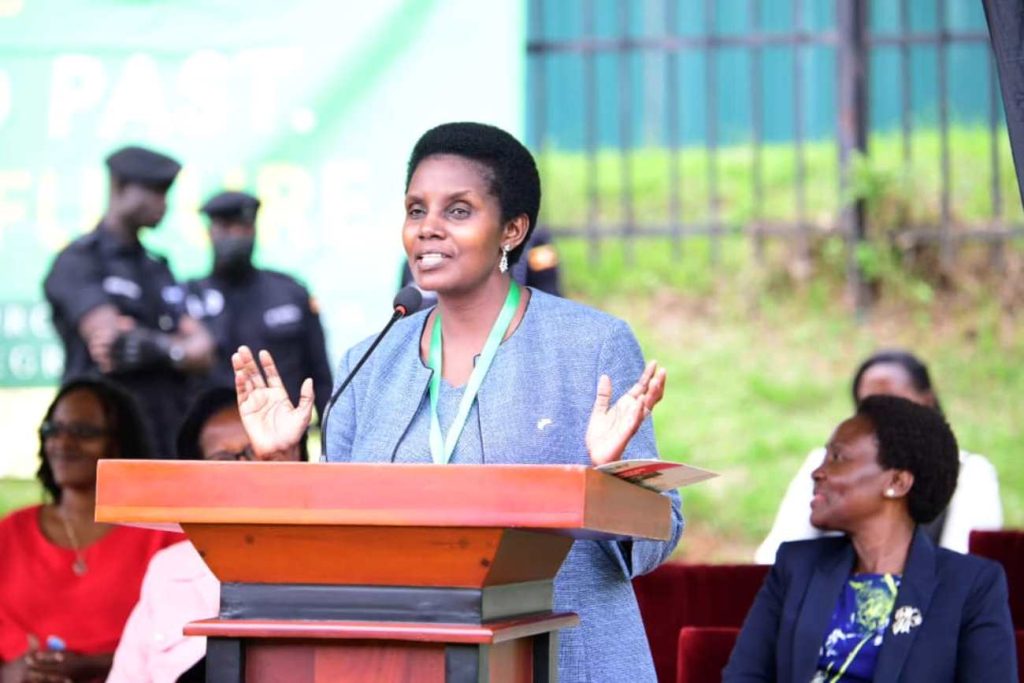
“Today, Makerere University is launching a new era of digital transformation in the management of students’ records and service delivery. We are changing the narrative of long queues, lengthy processes and we are now moving to efficient and digital services. We are here also to commission the registry of the students’ records and archive. The registry has been fitted with modern shelves with the capacity of storing over 30,000 students files but as we have seen, there is room for improvement and expansion. The archive has been fitted with modern shelves that have a capacity of storing over 100,000 students’ files and 21 wagons will store 170,000 students’ files,” Mrs. Mushengyezi declared.
Recalling the genesis of the DARP Project, Mrs. Mushengyezi shared that when the Government allocated support to the university’s research and innovations fund in 2019, she approached her colleagues and together, they submitted a project proposal. The project identified several challenges which were affecting records management at Makerere University namely; manual records handling, inadequate storage space, inadequate security for records, inexistent policy on records management, and lack of a system to streamline records management. The DARP project therefore set out to address these gaps with the ultimate goal of operating e-services.
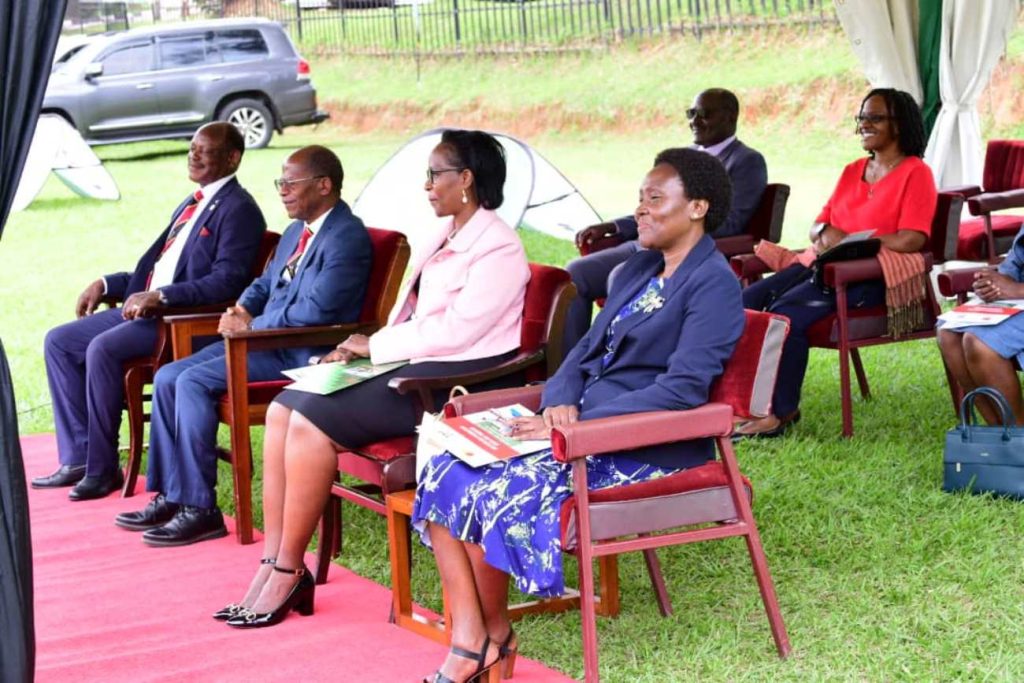
“The objectives of DARP Project were to digitalize academic processes including students’ files and examination results and other documents like senate minutes. We wished to establish a students’ records verification and certification Centre. We also wanted to use ICT to improve efficiency in conducting senate meetings and to archive existing manual documents into properly bound and referenced files. It has been a lot of hard work by the project team, but we have seen God’s hand in this transformational journey. I wish to say that we have achieved 95% of our objectives,” Mrs. Mushengyezi stated.
The Principal Investigator noted that the DARP project had created efficiency in the academic Registrar’s department with ability to generate reports on number of students by categories such as course, graduation cohort, academic disciplines i.e. Medicine, Law, Engineering etc., current enrolment and progression, as well as policies passed by the University Senate per year, and so on.
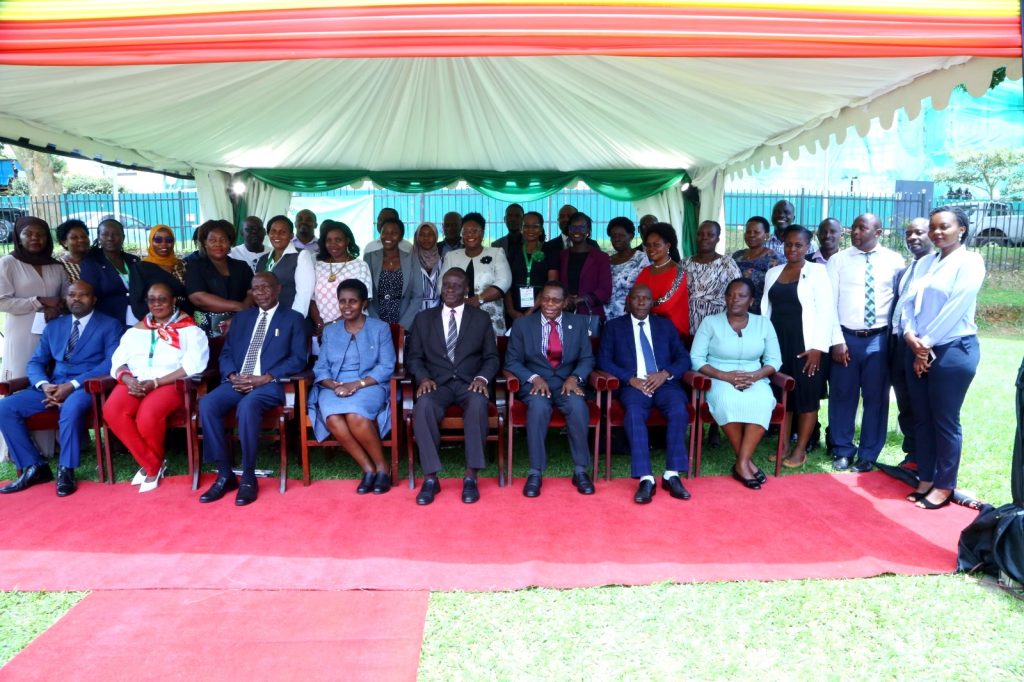
She thanked the Government of Uganda for funding the entire process by providing laptops, access control systems, CCTV cameras, printers, furniture, archival boxes, the 21 shelves, the wagons, stationery and facilitation of the entire team. She also thanked Mastercard Foundation for the support through the relief fund.
She appreciated the entire Makerere University Council and Management for the support rendered towards the establishment of the DARP project and for prioritizing the Project as a university programme. In a very special way, she acknowledged Prof. William Bazeyo, the former Deputy Vice Chancellor (Finance and Administration), Prof. Fred Masagazi Masaazi-Chairperson of Mak-RIF Grants Management Committee (GMC), Prof. Umar Kakumba, Deputy Vice Chancellor (Academic Affairs), Mr. Alfred Masikye Namoah, former Academic Registrar and the Academic Registrar, Prof. Buyinza Mukadasi, the University Secretary, Mr. Yusuf Kiranda, Deputy Registrars namely Mr. Charles Ssentongo and Mr. Tom Otim, for providing tireless support.
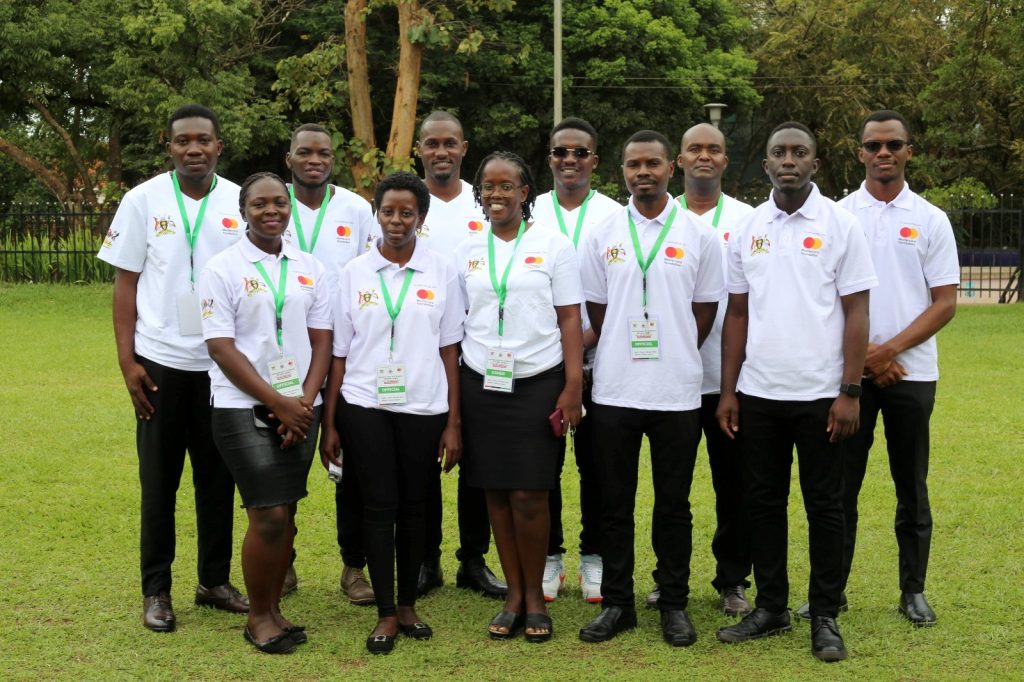
In addition, she recognized the supervisors in the Directorate of Research and Graduate namely Prof. Edward Bbaale and Ms. Prossie Nakayiki.
The Principal Investigator, Mrs. Mushengyezi also appreciated the members of staff whom she referred to as DARP Foot Soldiers for organizing, sorting and scanning the records.
In recognition of her selfless service and leadership, the DARP project team members through the Vice Chancellor, Prof. Barnabas Nawangwe presented Mrs. Patience Mushengyezi with a plaque and bouquet of flowers.
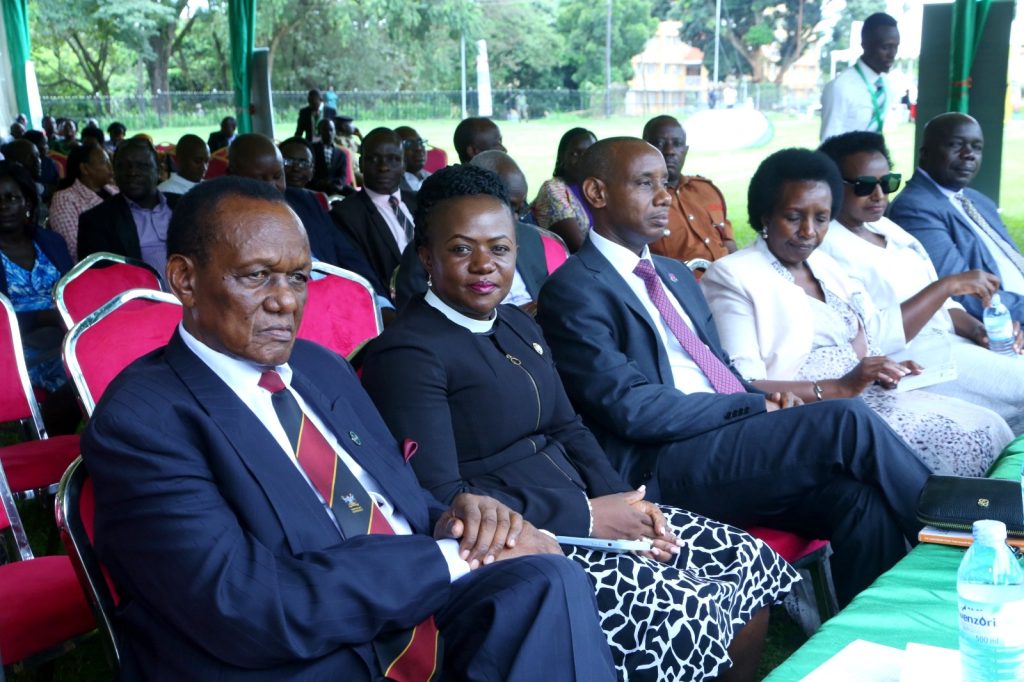
The DARP project launch was graced by the Chancellor Emeritus, Prof. Ezra Suruma, Members of Parliament, Vice Chancellors of other Universities, former Vice Chancellors, former Deputy Vice Chancellors in charge of Finance and Administration, the Makerere University Students’ Guild, and Mrs. Mushengyezi’s family. The Chaplain, St. Francis Chapel, Rev. Dr. Lydia Nsaale Kitayimbwa led the opening prayer while the event was moderated by Dr. Zahara Nampewo, the Deputy Principal of the School of Law and Ms. Ritah Namisango, Principal Public Relations Officer and Chairperson of the Protocol, Publicity and Media Sub-Committee for the launch. The Department of Performing Arts and Film was on hand to lead the anthems and keep the guests entertained.
General
Mak holds Mental Health Awareness Campaign for International Students
Published
3 days agoon
April 22, 2024By
Mak Editor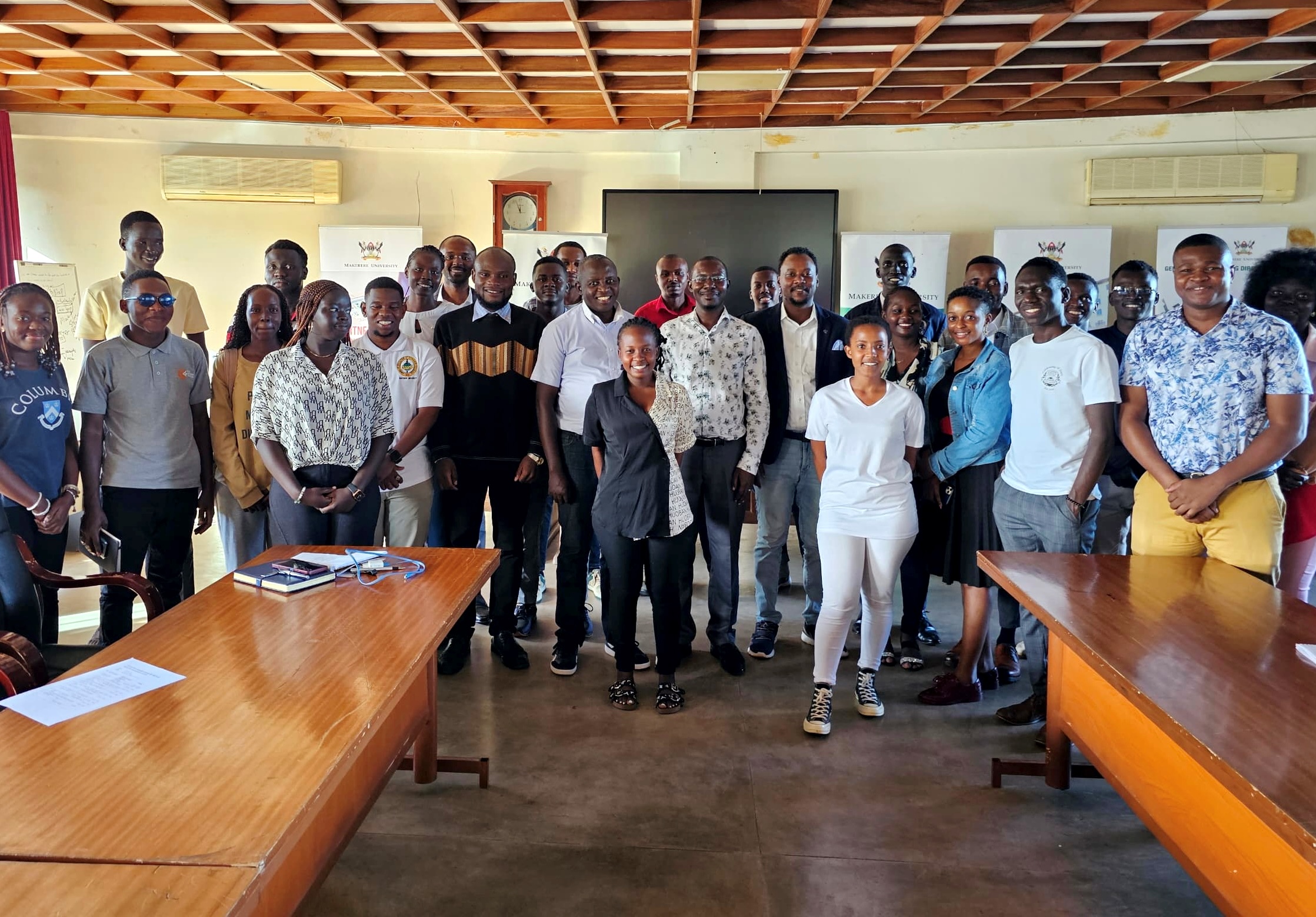
By Betty Nabisubi
On Friday 12th April 2024, over 100 international students convened at Makerere University to participate in the Mental Health Awareness Campaign organized by the International Students Union in partnership with the Counselling and Guidance Centre, International Office and Office of the Dean of Students.
The campaign, which included both physical and virtual participants, rallied international students to always ask for help. The annual event enables students to participate in engaging discussions, and provides a platform for them to openly share and address personal and academic challenges, both on and off campus.
The aim of holding a mental health awareness campaign for international students in the university is to promote mental well-being and provide support and resources for students facing mental health challenges. Furthermore, it seeks to raise awareness about common mental health issues, reduce stigma surrounding mental illness, and educate students on available mental health services and support networks. Additionally, it aims to empower students to recognize signs of distress, encourage help-seeking behavior, and foster a supportive and inclusive campus community where students feel comfortable discussing mental health concerns.
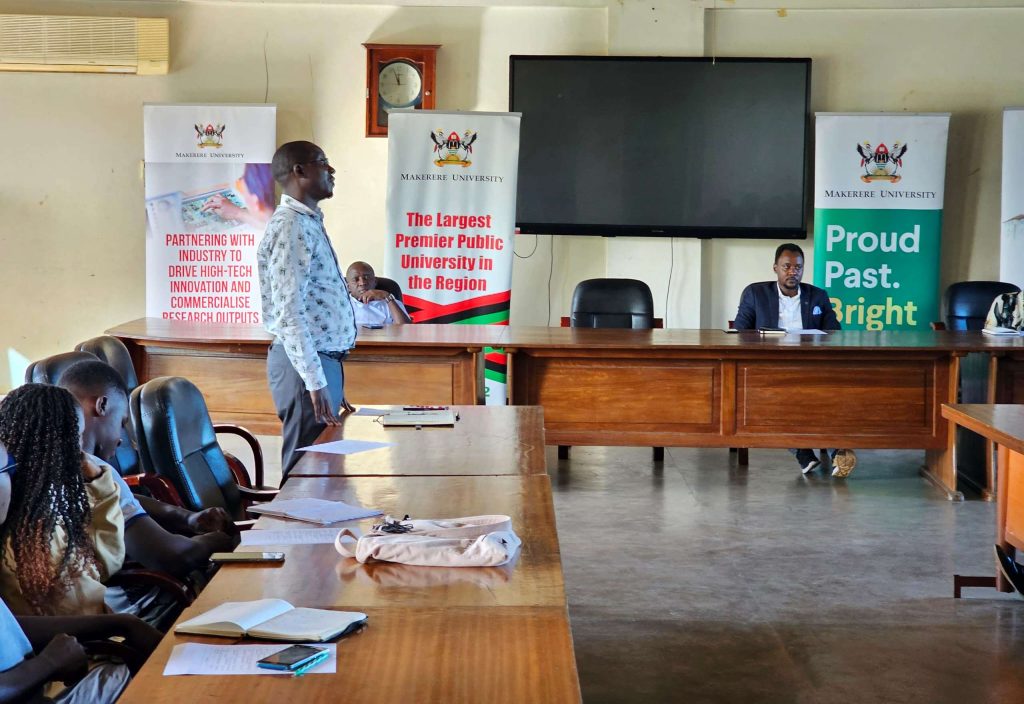
In line with the Mental Health Awareness Campaign theme; It is ok to ask for help, each Official urged the international students to seek guidance and support from the right offices and entities within the Makerere University system.
The Office of the Dean of Students represented by Mr. Peter Mwanja, Warden of University Hall emphasized the importance of students seeking help rather than isolating themselves in their hostels when faced with problems. He urged students to refrain from complaining about lack of assistance, but instead take action by speaking up when faced with challenges. Mr. Mwanja pledged to stand with the students throughout their academic journey so as to ensure that they have a fruitful stay at Makerere University.
In the same spirit, the Manager of the Makerere University Counselling and Guidance Centre, Mr. Henry Nsubuga called upon international students to utilize their services. He appealed to students to seek for help whenever they feel distressed.
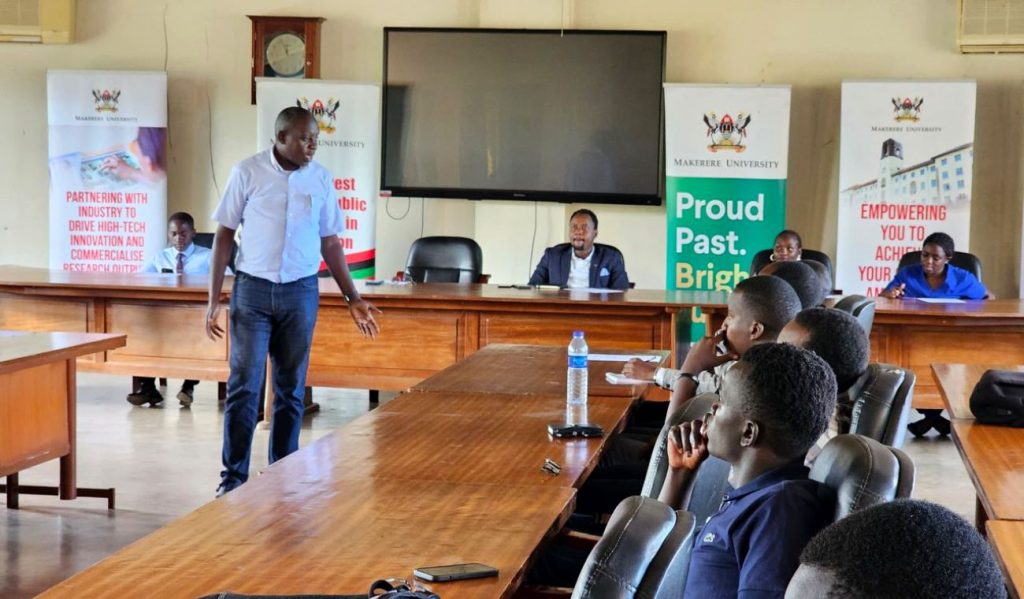
“Please come to the Centre when you need help. The Centre is ready to provide assistance upon any distress signal. I assure you that nobody will judge you for not being okay. We have professional counsellors who are willing to help,” remarked Mr. Nsubuga. The Makerere University Counselling and Guidance Centre is conveniently located at Plot 106, Mary Stuart Road, opposite Mary Stuart Hall.
Dr. Gardner Herbert from the Julius Nyerere Leadership Centre at Makerere University emphasized the importance of emotional intelligence, which encompasses the ability to understand, manage, and express one’s own emotions effectively, as well as to recognize and respond appropriately to the emotions of others. He highlighted the significance of students possessing skills such as self-awareness, self-regulation, social awareness, and relationship management.
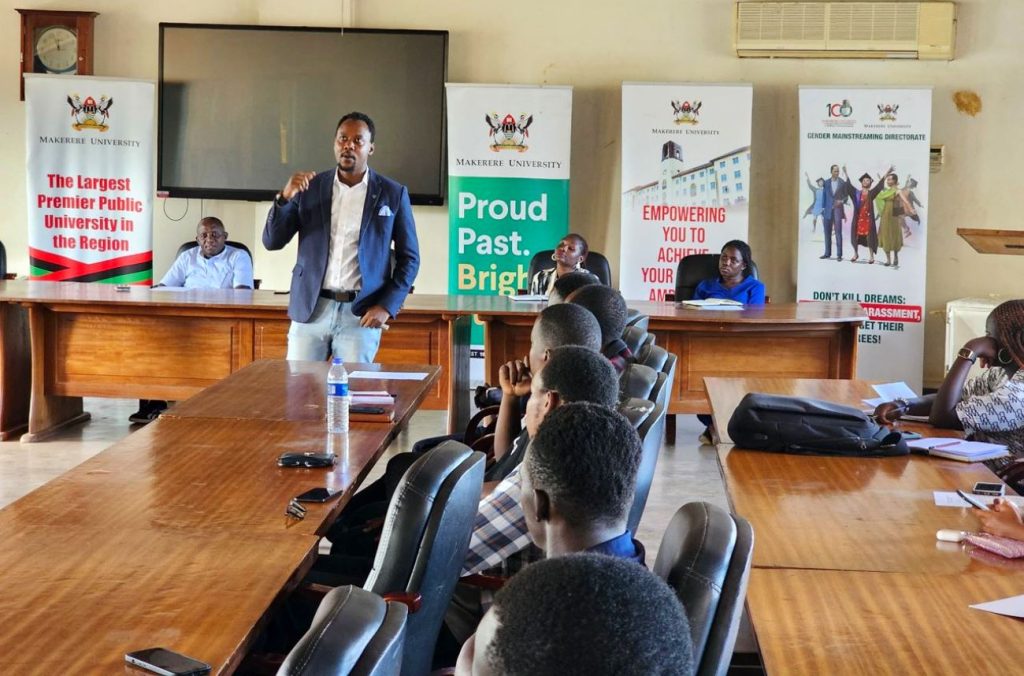
Self-awareness, he emphasized, serves as the foundation of emotional intelligence. This involves recognizing and understanding one’s own emotions, strengths, weaknesses, values, and motivations. Dr. Gardner explained that ndividuals with high self-awareness are better equipped to comprehend how their emotions influence their thoughts and behaviors, leading to more informed decision-making and greater self-control.
Mr. Gerald Ochwo on behalf of the Makerere University International Office encouraged the audience to visit the premises on Flat A5, Block A, Lincoln Flats for their mandate is anchored on ensuring that International students’ university experience is enriching. Furthermore, he emphasised the importance of students managing their visas proactively, instead of rushing to renew them either at the last minute or upon expiry. He pledged to organize more events to foster relationships among students.
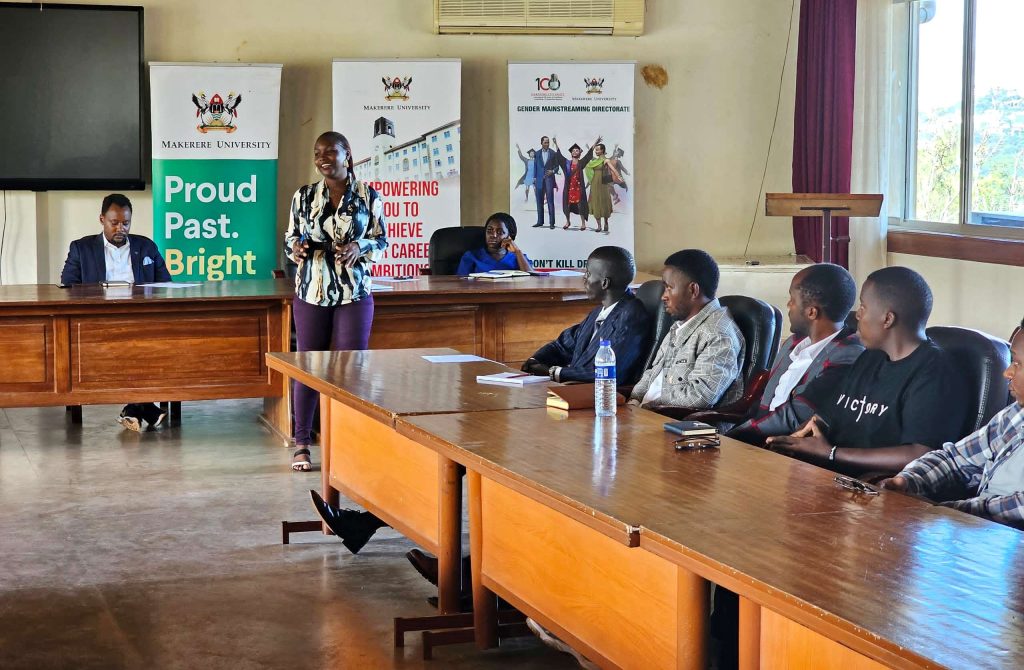
Focusing on nurturing a supportive environment for students away from home, the International Office invited Ms. Olivia Mwanje, a student of Makerere University pursuing a Master’s degree in Climate Change and Development at the College of Agricultural and Environmental Sciences to share a lived experience.
Ms. Mwanje was one of the beneficiaries of the exchange students’ programme to Utrecht University in the Netherlands. Her testimony served to demonstrate to international students that with dedication and sacrifice, it is possible to leave one’s home country, study abroad, and excel both academically and personally. She encouraged students to remain focused on their academic programmes despite the allure of other pursuits.
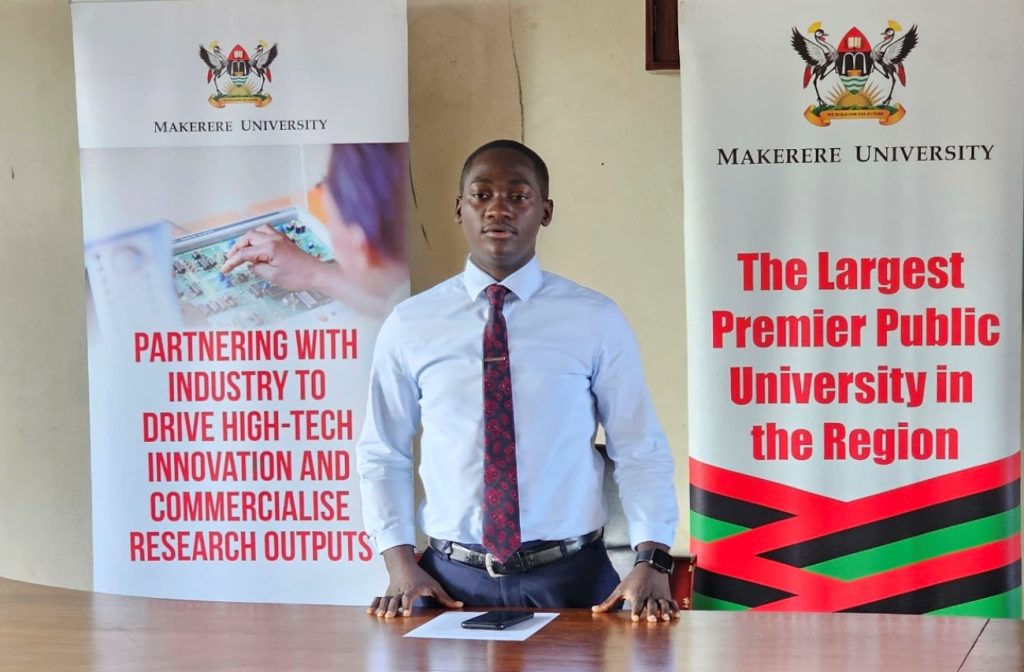
“I urge you, fellow students, to remain steadfast in your educational aspirations while exploring the opportunities available. Prioritize your academic goals over non-academic pursuits,” said Ms. Mwanje. She stressed that deviating from the primary objective leads to unintended consequences. For instance, she shared stories of students who abandoned their academic pursuits for menial jobs upon arrival abroad. Ms. Mwanje advised students to stay committed to their studies and, upon completion, pursue other non-academic endeavors if they so desire.
The Guild President, H.E. Vincent Lubega Nsamba expressed the Guild Leadership’s strong commitment to ensuring that international students have a comfortable stay at Makerere University. He encouraged international students to seek counselling whenever they feel distressed and emphasized the importance of talking to peers for support.
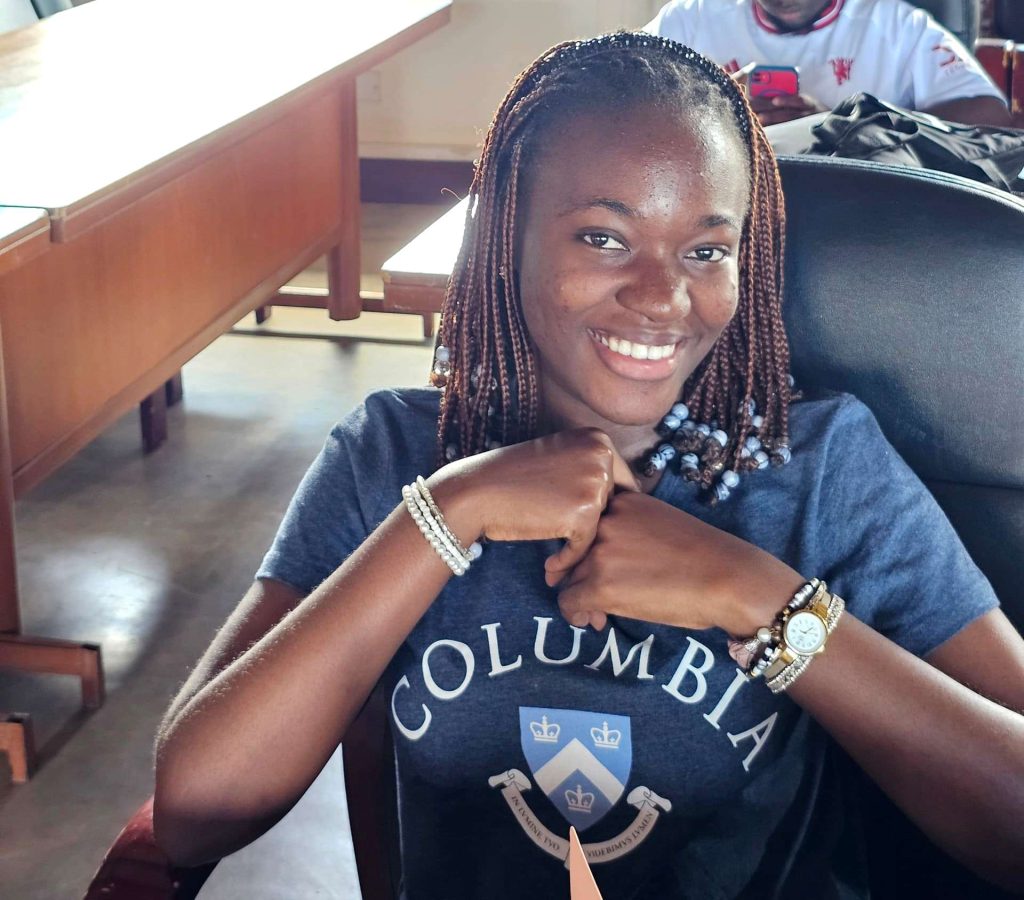
One of the international student leaders, Mr. Harrison Igwe expressed enthusiasm for organizing activities that promote unity within the international student community at Makerere University. The goal of the activities, he said, is to enhance camaraderie and strengthen support networks among international students.
Trending
-
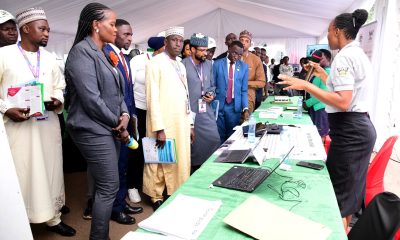
 Computing & IS1 week ago
Computing & IS1 week agoFree Course: Introduction to Data Science
-
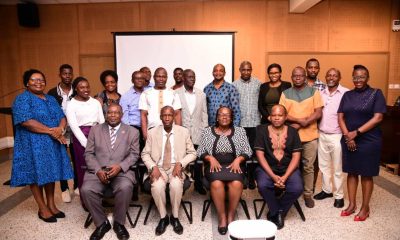
 Education6 days ago
Education6 days agoGovernment Asked to Make Fine Art Compulsory in Secondary Schools
-
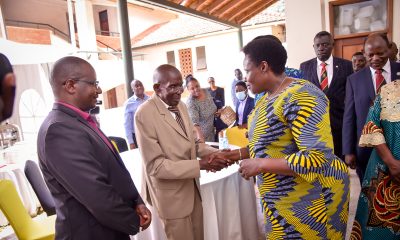
 General1 week ago
General1 week agoProf. Justin Epelu-Opio, Our Longest Serving DVC Rests
-
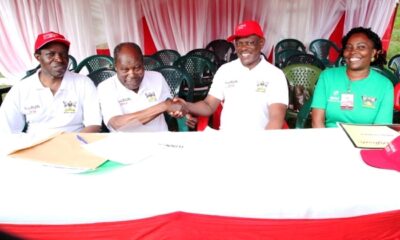
 General1 week ago
General1 week agoDr. Martin Aliker – Celebrating A Life Well Lived
-
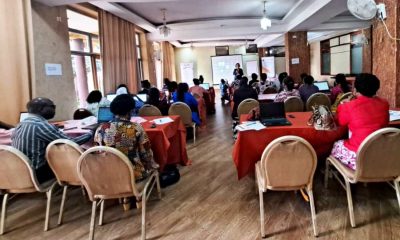
 General2 weeks ago
General2 weeks agoHERS-EA Seventh Academy
